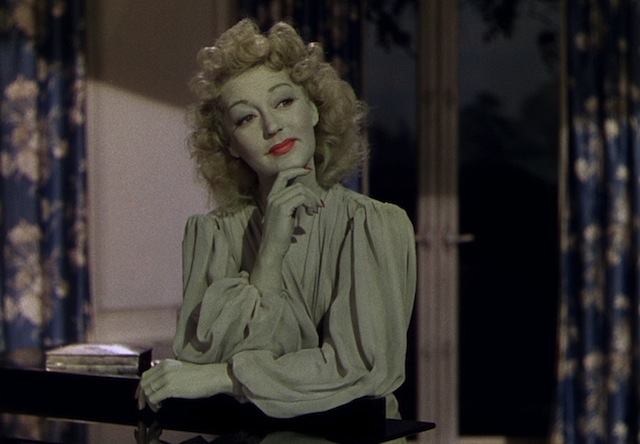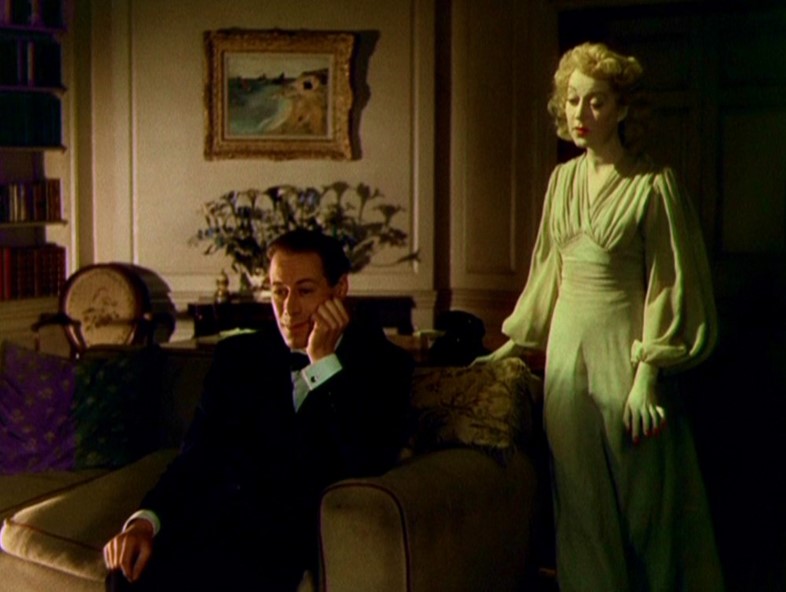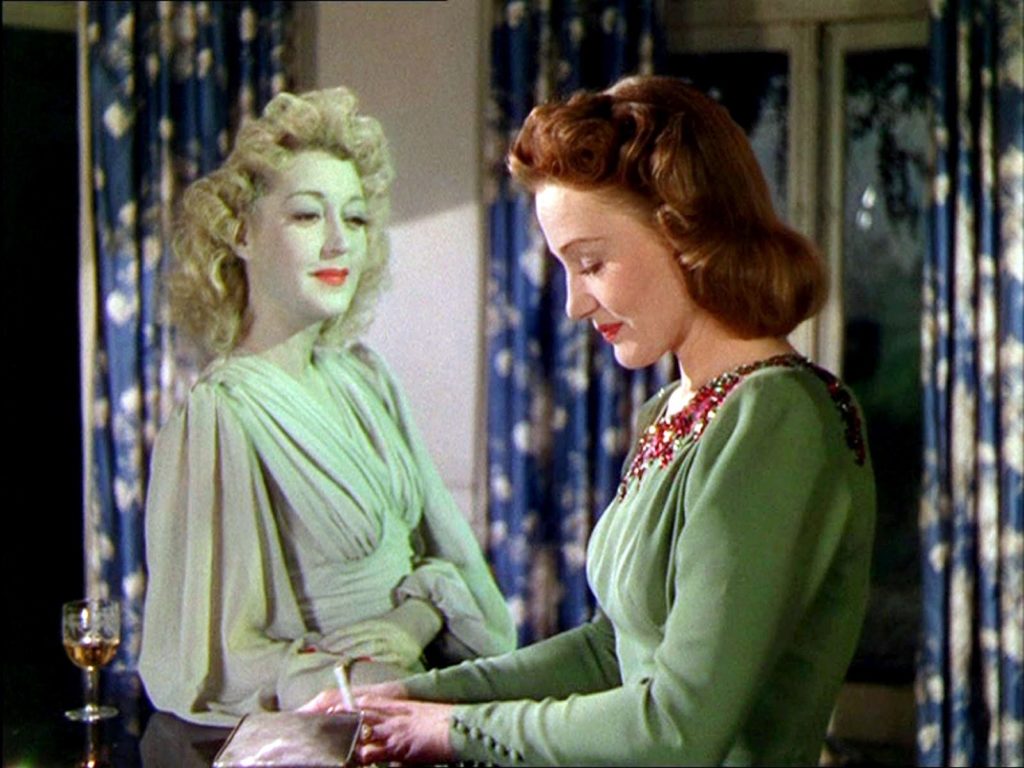This post is part of the David Lean blogathon, hosted by Maddy Loves Her Classic Films. See the other posts here.
When the ouija board made its commercial debut in the 1890s it was marketed as a parlour game. Charles Condomine takes a similarly playful approach to the supernatural in Blithe Spirit and unleashes havoc. The line between the mundane and the fantastic is thinner than he thinks.
Charles Condomine (Rex Harrison) is a successful novelist, happily ensconced in the English countryside with his wife Ruth (Constance Cummings). Their marriage is a harmonious one, based on the virtues of mutual, measured affection. “We’ve both been married before,” Ruth tells him as they dress for dinner. “Careless rapture at this stage would be incongruous and embarrassing.” Their guests this evening are Dr. Bradman (Hugh Wakefield), his wife Violet (Joyce Carey) and Madame Arcati (Margaret Rutherford), the famed medium, whom they have invited to conduct a séance. Neither the Condomines nor the Bradmans believe in the occult. Instead, Charles is writing a mystery involving a fake spiritualist and wishes to observe the tricks of the trade—and treat his guests to a night’s entertainment at Arcati’s expense.
Madame Arcati is ripe for ridicule. Cycling up to the Condomines’ house, her scarf flapping in the wind, she has the air of a games mistress at a girls’ boarding school—too cheery and robust to be ethereal. Rutherford, performing the role she originated on stage, is hilarious but completely sincere. Arcati prepares for the séance by inhaling lungfuls of air and marching around the room reciting nursery rhymes. Unable to help himself, Dr. Bradman cracks a joke about her ghostly assistant, who having died in the 1880s “must be long in the tooth, I should think”. “You should think Dr. Bradman, but I’m sure you don’t, at least not profoundly,” the medium replies. Arcati is eccentric, but no fool.
The séance begins and suddenly the mood curdles. Madame Arcati goes into a trance and Charles hears a voice no one else seems to. Unnerved, he ends the séance. Order is restored. Except that it isn’t: Elvira (Kay Hammond), Charles’ dead first wife, has arrived.
Blithe Spirit is a black comedy masquerading as a drawing room farce. On holiday in Wales as a respite from the Blitz, Noël Coward wrote a play about ghosts and the constant presence of death—and with his usual audacity, made it a comedy. Charles Condomine finds himself in a love triangle—a device which had served Coward well in Easy Virtue and Private Lives—except one of the parties happens to be dead. All three Condomines are genteel on the surface and thoroughly vicious underneath. They have to be. If any of them were sympathetic, their predicament would be too sad to laugh at.
Lean, who adapted the screenplay along with Anthony Havelock-Allan and the film’s cinematographer, Ronald Neame, keeps the savagery and wit intact. During an argument Ruth lists all the women she believes Charles has been dominated by, conveniently excluding herself. “If you wish to make an inventory of my sex life, dear, I think it’s only fair to tell you that you’ve missed out several episodes. I’ll consult my diary and give you a complete list after lunch,” Charles replies with aplomb.
Rex Harrison didn’t want to make Blithe Spirit. He was serving in the Royal Air Force, wasn’t fond of the original play and resented being cast in its adaptation. His irritation may or may not have fed Charles’ prickliness, which grows more delightful and more pronounced as his world unravels.
Speeding the disintegration along is Elvira. The late Mrs. Condomine is blown into the room on a breeze, an eldritch figure completely green, save for her red nails and lips. Charles greets her with the panic of a man who discovers the floor and ceiling have swapped places while his back was turned. Recreating a role she played on stage, Hammond’s Elvira is capricious, mischievous, manipulative and arch, often in the same scene. Charles initially sees her as an escape from Ruth and Elvira manipulates them both because she wishes to be reunited with Charles permanently.
Yet Ruth won’t surrender without a fight. As stodgy as Elvira is louche, she has to be convinced her opponent even exists. To be fair the Condomines’ house, seen by daylight, is reassuringly prosaic: Neame shoots it in a warm Technicolor palette of pastels. Lest we sympathise with her, Cummings plays Ruth with such unyielding self-righteousness that it’s a pleasure to watch Elvira turn poltergeist and terrorise her. (The Oscar-winning effects were by Tom Howard.) Charles’ fantasy of two doting wives assumes Ruth’s co-operation; unsurprisingly, the reality soon palls.
In his autobiography Coward draws “a light, spangled veil” over Lean’s version of Blithe Spirit and damns it with faint praise: “It wasn’t entirely bad, but it was a great deal less good than it should have been.” Lean had the misfortune of making his first comedy out of a play Coward considered one of his best. Not that the film is without flaws. Most of the action takes place in the Condomines’ house—a device that works well on stage, less so on camera—and the staging occasionally feels airless. Yet the film is also frothy and impudent in all the right places. The moral of the story is: don’t toy with the supernatural, lest it toy right back.



I can’t say I agree with Mr. Coward on his assessment. I’ve seen productions of the play several times and have do not feel the movie lacked anything in the treatment of his trenchant wit. In fact, I find it a pleasure.
I’m glad to hear it. I’ve never had the chance to see ‘Blithe Spirit’ on stage and always wondered how it would compare with the film.